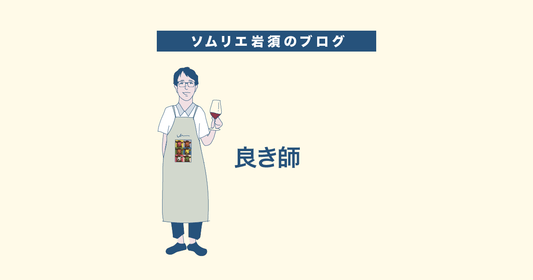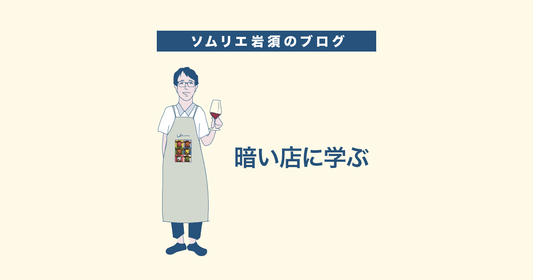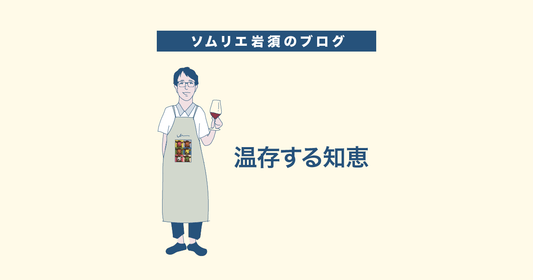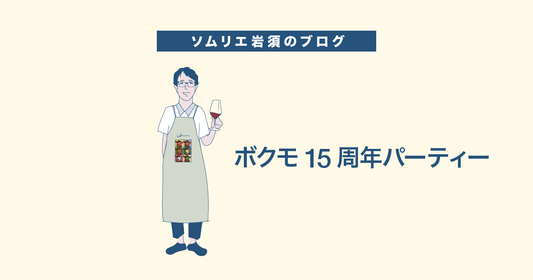
"I'm going to a training session for work soon."
When I hear stories of such customers, I feel truly envious. That's great. Training.
"It's a one-night trip to Fukuoka. Well, the training is for work, so I can't do much sightseeing. But I'll go for a Mizutaki dinner."
There! You're having Mizutaki for dinner! I'm jealous.
Due to the nature of my job, I have almost no experience with training. I only occasionally attend wine seminars. But to me, seminars and training have slightly different meanings. Seminars are something you go to voluntarily to deepen your knowledge, but training is something you go to because your boss says, "You need this for work, so go and learn."
That's nice. I don't have a boss. I wish someone would say to me, "Study hard and study hard." I'm sure I can do my best in the tough training for the sake of Mizutaki at night.
However, I finally got the chance to participate in the training course I had been longing for. It was the "Alcohol Sales Management Training" course , which is necessary to start a wine shop. Yay!
The location is in Fukuoka. No, it's Higashi Betsuin, 2 blocks away by subway from Yabacho, where the shop is located. It's close. But that's okay. Even if it's close, training is training.
By the way, I haven't had much chance to go to Higashi Betsuin Temple, even though it's close by. I'll take this opportunity to walk around a bit. That's right, I'll go early and have lunch somewhere before going to the venue.
As it is a temple town of the huge Shinshu Otaniha Nagoya Betsuin temple , there are some old streetscapes remaining around the station. The cherry blossoms are in bloom and it feels nice. It's worth walking around.
And then I found it. A noodle shop with a retro atmosphere.
"Tokyo An".
It seems to be a restaurant that serves a variety of noodles, including soba, udon, kishimen, and rice bowls. After a quick google search, I found out that the restaurant was originally located in Tokyo, but moved to Nagoya during the time of the previous owner. It first opened in Tokyo in 1925, and moved to Nagoya in 1959. It's been 96 years since it was founded. It has an incredible history. The interior of the restaurant is very Showa-era and very relaxing.
I like the "Chuka Soba" that you can find in these kinds of restaurants. I like the simple flavor that you can't find in ramen specialty restaurants. I ordered the Chuka Soba set without hesitation.
What came out was a traditional ramen with udon soup stock. This is it. It didn't disappoint. It was very delicious. In terms of happiness, it may not be inferior to Hakata Mizutaki. Ah, training is really good. I haven't trained yet though.

The inari was also delicious.
From there, it was a 20 minute walk to the venue.
The training venue is in a Showa-era building, with Showa-era toilets, and Showa-era desks and chairs.
And then, an older man who must have been born in the early Showa period put his mouth closest to the microphone and the training began. Today is Showa Day.
The handbook on the desk is quite thick, about 140 pages.

Sales Management Training Handbook
At the beginning, the person from the Showa era said:
"Today we'll be doing slides, so you can keep this thick handbook closed."
picture?
"Some people close their eyes every time, but I don't pay any attention to it."
picture?
Upon closer inspection, I noticed that even though the training had not yet begun, there was a "Certificate of Attendance" on the desk proving that the training had been completed.
already?
Somehow, this training seemed a bit lenient.
The Liquor Tax Law stipulates that "at least one person must have undergone training at an alcohol sales outlet." Therefore, this training is not only for liquor stores, but also for people working at supermarkets, convenience stores, drug stores, and electronics retailers. Perhaps some people are reluctantly coming because their company told them to. Perhaps the reason they said "it's okay to sleep" was for such people.
But, Showa-san, I'm here to tell you. There are people who are enthusiastic about the training. There are people who are participating with fervor because they are going to start their own wine shop.
I'm in high spirits after eating some ramen noodles. I paid 5,000 yen for the course, so I want to get something worth it.
However, you see. I have the opportunity to work as a wine lecturer myself, and I have to be careful not to take the wrong attitude of "You don't have to listen too seriously." This is a lesson learned from past experiences.
So, when I started the first "Alcohol Sales Management Training" I took, the content was not easy at all, and the important things in the handbook were explained in slides. There were a lot of things I didn't know. I took notes on the things I thought were important, so I'll share them briefly here.
・In accordance with the Minors' Drinking Prohibition Act, alcohol cannot be sold to people under the age of 20. This must be clearly indicated. As the age of adulthood will soon be reduced to 18, it will no longer be possible to use the expression "not for sale to minors."
・Alcoholic and non-alcoholic products on display shelves must be clearly separated. The two types of products must not be displayed next to each other on shelves that do not have a clear separation. Stores that do this will be subject to guidance.
・Pay attention to the size of the letters that say "Alcohol Corner." They are over 100 points in size. In other words, the letters are over 35mm x 35mm in size. They are quite large.
・Be careful of "unfair cheap selling" that is prohibited by the Antimonopoly Act. Selling at too low a price is no good. Also be careful of "selling unsold goods below cost."
・Beware of "unfair advertising" that is prohibited by the Act on Unjustifiable Premiums and Representations. Saying things like "This price only today" when the price is the same as usual is a no-no.
・Keep proper accounting records. Keep them for 5 years. I was told to keep them in print, not electronic form. Seriously, I need to secure storage space for paper.

Sales Management Training Handbook
However, what stuck in my mind the most that day was the Chinese noodles.
The deliciousness and satisfaction of the food improved my condition. I think it had a big impact on my attitude towards the training I undertook after.
That's right!
Delicious food motivates people.
Thanks to the positive feedback, I was able to enthusiastically participate in the training, even though it was a relaxed session.
I see... I've been in the restaurant business for 11 years, but I've forgotten the power it has. I want to continue to provide delicious food and satisfying food at my own restaurant. That's because it helps to motivate someone. That's what I thought again.
I want to go back to the shop that made me feel this way. I also want to explore Higashi Betsuin a bit more.
If I were to go, then it would be best to call it a training session, so let's call it a "training session to explore the appeal of long-established restaurants."
Next time, I want to eat Kishimen noodles.
By the way, when I got home and looked closely at the certificate of completion I was given, I noticed that the printing was off-center.
As expected, it's loose...

This must be displayed in the store for three years.
This week's wine and snacks
Mahi WARD FARM PINOT NOIR 2014

My favorite New Zealand wine is "Mahi" . Among them, Ward Farm Pinot Noir is a little more expensive. It is a so-called single vineyard wine, and uses carefully selected grapes only from the "Ward Farm" plot. Fermented with wild yeast. Aged in barrels for 15 months.
The taste is very complex. The bitterness is noticeable immediately after opening, but on the second or third day it becomes perfectly rounded and harmonious. The fruit flavor is subtle at first, but then comes over later.
If you want to drink it right away , decanting is a must. When I actually visited Mahi Winery, the owner Brian Bicknell let me taste it, and he also poured it into a glass after decanting it himself. In the first place, it is designed to take time to open up.
This is a fun drink that allows you to enjoy the aroma and flavor that changes over time.
I thought that if I were to pair it with something, it would probably be meat, but then I suddenly remembered a rule I have in my head that "Pinot Noir goes well with soy sauce," so I tried pairing it with this.

Ise udon.
The thick, loose udon noodles are reminiscent of porridge, and the dark, rich soy sauce sauce is perfect. Because the noodles are already soft, you can eat them slowly as a snack without worrying about them getting soft again.
As expected, the Pino and soy sauce went well together. The egg yolk was also good. After all, it's better to have fun pairing at home. International marriage with surprises is fun.





